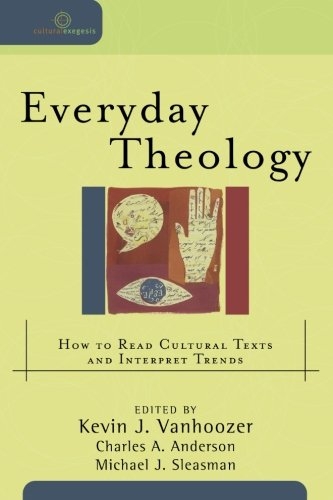Everyday Theology: How to Read Cultural Texts and Interpret Trends, reviewed by Bradford McCall
 Kevin J. Vanhoozer, Charles A. Anderson, and Michael J. Sleasman, eds. Everyday Theology: How to Read Cultural Texts and Interpret Trends (Grand Rapids: Baker Academic, 2007), 287 pages.
Kevin J. Vanhoozer, Charles A. Anderson, and Michael J. Sleasman, eds. Everyday Theology: How to Read Cultural Texts and Interpret Trends (Grand Rapids: Baker Academic, 2007), 287 pages.
It is well established that knowledge without application is fruitless. Additionally, it is well understood that one can know of a subject, but not really know it. In the twenty-first century, it is critical that Christians learn not only about culture, but also how to interact with culture. The title currently under review attempts to set forth ideas of how Christians are to relate with contemporary culture. Foundational to any attempt to interact with culture is the hermeneutical understanding of texts and trends within that culture.
Usually, students, theologians, and pastors are well-trained in the task of biblical exegesis, but when it comes to understanding culture, there is often a great disconnect. In the second title under review, Kevin J. Vanhoozer (Research Professor of Systematic Theology at Trinity Evangelical Divinity School), Charles A. Anderson, and Michael J. Sleasman, edit essays that seek to explore the area of cultural exegesis – that is, reading and interpreting the texts and trends produced by culture. This title, Everyday Theology, is the first volume in a new Cultural Exegesis series. Each volume is intended to work within a specific cultural discipline, illustrating and embodying the theory behind cultural engagement. By providing the appropriate tools and methodology, this series seeks to equip the reader to engage and interpret the surrounding culture responsibly.
This book is intended to be used by Christians; it is the result of four years of coursework by the students of Vanhoozer, meaning that each chapter (following the excellent introduction by Vanhoozer) is a revised version of term papers submitted to Vanhoozer in his “Cultural Hermeneutics” class at TEDS. It is comprised of four parts: 1) an introduction that sets out the methodology to be employed, 2) essays that employ the methodology to interpret specific cultural texts, 3) essays that attempt to make sense of more complex trends and movements, and 4) a postscript that essentially summarizes the preceding chapters and leads the reader step-by-step through the interpretation process. The purpose of the book is to teach Christians to get the theological lay of the cultural land.
More specifically, in the introduction Vanhoozer proposes that we understand the world in, behind, and in front of a cultural text (drawing from Adler). Thereafter, one will find a series of essays that engage cultural texts and trends, from the gospel according to Safeway, the music of Eminem, the historical context in which the UN’s Universal Declaration of Human Rights took shape, an exploration of Church architecture, the phenomenon of Internet blogs, to the transhumanist movement. As this selective list indicates, the essays herein are diverse and appealing.
Vanhoozer’s essay alone is worth the price of the entire text. Moreover, I appreciate the sidebars throughout the texts that contain editorial comments that unite the individual essays to the overall content of the title. Although most of this text is usable for every-day life, there is a significant reservation of my own, however. I am a theologian who uses the theological jargon, but most readers, presumably, of Everyday Theology will be just that – everyday people. As such, some of the terminology used by Vanhoozer will be cumbersome (e.g., he employs the terms locutionary, perlocutionary, and illocutionary to communicate his framework in the introduction). I find that this perceived flaw is limited to Vanhoozer’s essay, however. In sum, one will not go wrong in reading this title, as it highlights a burgeoning area of theological inquiry: cultural exegesis and hermeneutics. With it, may we go forth, crossing borders and doing everyday theology.
Reviewed by Bradford McCall
Editor’s note: Bradford McCall’s review of Everyday Theology was originally published on September 14, 2010 on the In Depth Resources page of the Pneuma Foundation website. Michael Muoki Wambua’s review of Everyday Theology was published in the Fall 2010 issue of Pneuma Review.
Category: In Depth


